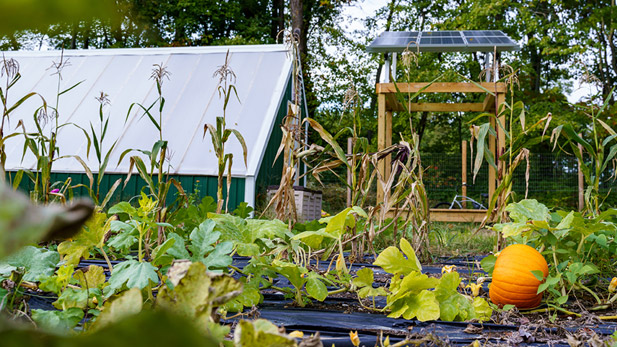Outdoor Makerspace Rooted in Sustainability

A campus outdoor makerspace is allowing students, professors and community groups to see sustainability in practice through a garden, greenhouse, educational classroom, biosand water filter system and beehive.
An existing campus garden has grown into a sustainability makerspace, with an outdoor classroom and areas for collaborative undergraduate research geared toward sustainability concepts and practices.
Supported by the Subaru of Indiana Automotive Foundation, American Society of Mechanical Engineers’ Environmental Engineering Division and alumni Becky and Frank Levinson, the initiative is being led by student members of the Engineers for a Sustainable World organization, HERE program and Gardening Club.
“Our new outdoor makerspace is a living, growing educational environment that will allow students, professors and community groups to see sustainability in practice. There’s unlimited potential for this campus space,” said HERE program director Jennifer Mueller, associate professor of civil and environmental engineering.
The garden grows vegetables and herbs that have been used in dishes served by the campus’ farm-to-table food service operations. Mueller points out that the cafeteria’s coffee grounds and compostable food waste will provide the garden with added nutrients to complete a food production loop.
Fourteen raised planting beds at the garden are watered by a drip irrigation system from a nearby pond, and a nearby greenhouse has solar-powered ventilation and irrigation systems to enhance growing conditions for plant seedlings.
Along with basic food production, the makerspace is being used for research and design projects by current students and faculty. These features include a biosand water filter system and a bee hive. Students may also suggest improvements to the greenhouse after studying the efficiency of the irrigation system and reviewing temperature and humidity measurements. The greenhouse also can serve as a space for experimenting and data collection about aspects of soil chemistry, plant biology and solar energy.
A weather station is expected to be installed in the spring of 2019.
There is hope that other elements will be added with additional funding to allow for experimenting with various approaches to sustainable food production, examining the biochemistry characteristics of composting, demonstrating stormwater treatment through bioretention or constructed wetlands, and experimenting with different types of biomass for more efficient biofuel production. A butterfly garden and rainwater collection system for the greenhouse and outdoor classroom could support the garden and research projects.
The outdoor classroom could be used to conduct educational programs each spring with visiting local elementary and middle school groups, and expand services for the HERE program’s Ryves Up afterschool sustainable education initiative with teachers, staff and students at Terre Haute’s Franklin Elementary School.